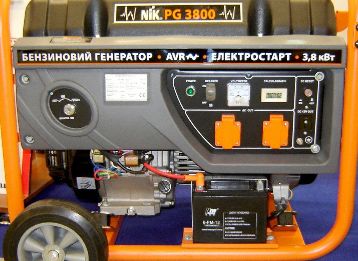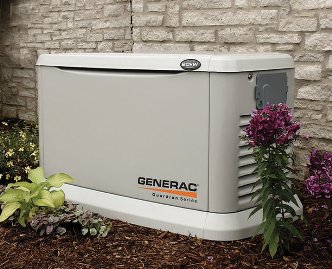Categories: Featured Articles » Autonomous power supply
Number of views: 17625
Comments on the article: 2
Gas or gas generator? Pros and cons ...
Portable generators can be used almost anywhere you need electricity. Tourists use them to light tv catering tents, enjoying the fresh air. Builders use generators to power power tools at construction sites not yet connected to the city’s power grid. In private homes and enterprises, generators are used as part of the power system, which allows you to continue to use various electrical appliances for the duration of a power outage in the main network.
But, regardless of their purpose, generator engines require fuel. Most portable generators run on gasoline or gas. Both types of fuel have their advantages and disadvantages, and we’ll talk about this.
Gasoline generators
Gasoline generators are the most common type of generator, because gasoline, unlike gas, can be purchased at any gas station. However, disadvantages of the gas generator also exist.

The first drawback of a gasoline generator is, of course, the price of gasoline. Even with today's significant drop in oil prices, gasoline is still a fairly expensive form of fuel. With the long-term use of a gasoline generator, fuel costs will amount to a pretty decent amount ...
The next disadvantage of a gasoline generator is its toxicity. During the operation of the gasoline generator, the exhaust gas contains a large amount of carbon monoxide (CO), which, even in small amounts, causes severe headaches, poisoning the body ... Spilled gasoline during refueling is quite flammable. A small spark is enough to cause a fire.
What is a generator? It is a source of electricity during an emergency when there is no electricity from the mains. Accordingly, at the nearest gas station there may also be no electricity to pump you gas.
Many owners of generators, preparing for emergencies, make fuel supplies, filling all available cans and barrels, forgetting that gasoline has a limited shelf life. This means that, according to GOST, you must use it for a year before gasoline loses its properties. And again, a correction should be made on the quality of gasoline. From practice, sometimes gasoline becomes worthless after 30-40 days, and sometimes after 1.5-2 years, the generator starts up with a half turn. So here is how lucky.
Gas generators. Liquefied and main
Gas generators are just starting to gain popularity with us for the same reasons as noted above. Our gas is mainly used for cooking and for heating rooms. But gas (natural and liquefied) as a fuel for generators is becoming increasingly popular due to the numerous advantages over gasoline generators.

Liquefied gas. Propane butane
Liquefied gas is supplied in cylinders that are practically impossible to spill and, even if it is bottled, propane immediately evaporates. The cost of propane is usually half the cost of gasoline, which is quite significant for long-term operation of the generator. Gas generators are generally quieter.
Unlike gasoline, liquefied gas has a long shelf life. It is recommended to use gas for 12-18 months, but, as the practical experience of many owners of gas generators shows, you can store propane-butane indefinitely, from which it does not get worse. This allows you to stockpile without worrying that he will lose his wonderful J properties.
It is possible to store a supply of liquefied gas both in separate cylinders of 40-50 liters and in gas tanks of 500 liters or more.
Main gas. Methane
Main gas is available in almost every home. The cost of kW of electricity generated during operation of the generator from mains gas is almost 10 times cheaper than the same kW of electricity generated during operation of the generator on gasoline. In addition, when the generator is operated “off the pipe”, there is no need to control fuel reserves and the generator can work an unlimited amount of time with the recommended rest breaks.
The disadvantages of gas generators include their more complex power system, and in case of breakdowns, unlike carburetor systems, it is not always possible to fix them yourself. In addition, using liquefied gas at significant freezing temperatures does not work.
In order to combine all the advantages of a gas and gas generator, you can use bi-fuel generators running on both types of fuel - gas and gasoline. You can purchase both a ready-made generator and alter it yourself using a special gas kit for converting a gasoline generator into gas, but we will talk about this in the following articles.
Sergey Seromashenko
See also at bgv.electricianexp.com
:
